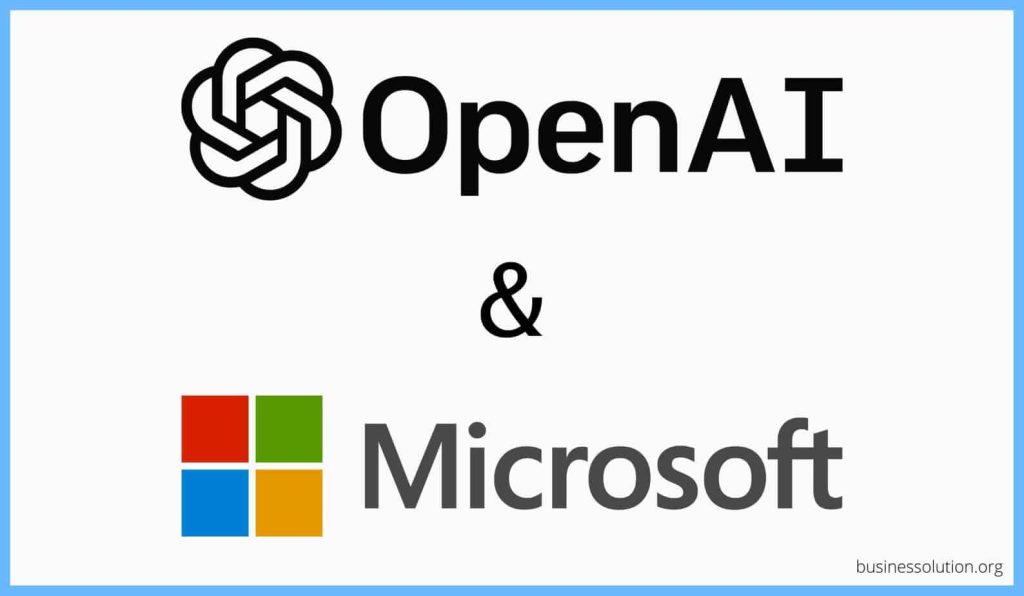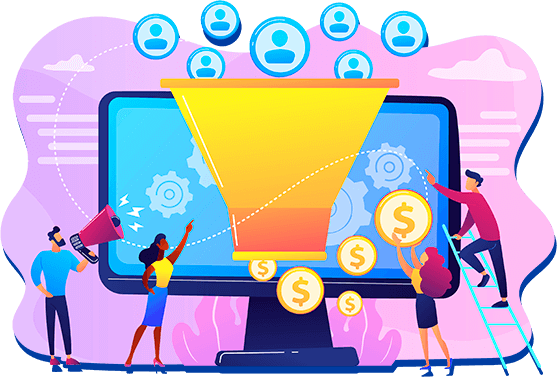ChatGPT is only a few months old, but it has already made a big impact in the tech industry by quickly gaining over 1 million users in just one week earning it the title of the fastest-growing tech platform ever.
Developed by OpenAI, this AI-powered language model has the potential to challenge Google’s dominance in the industry.
In this article, we will explore the potential for a partnership between Microsoft and OpenAI, the role of cloud computing in this partnership, and a possible $10 billion deal that could be the biggest tech deal of the century.
Additionally, we will examine the potential for Microsoft and OpenAI to challenge Google’s dominance as the number one search engine and how ChatGPT is already being incorporated into Bing.
Let’s get into it.
Table of Contents
The potential for Microsoft and OpenAI to challenge Google’s dominance in the AI industry
OpenAI, the creators of ChatGPT, are currently very successful but another well-known company, Microsoft, has been secretly planning and waiting for this moment for years as it may make them the true winner of the AI battle and the billions of dollars that are at stake.
As we’ll cover in depth later, they plan to make a huge $10 billion deal with OpenAI, which could be the biggest tech deal of the century.
If they succeed, they will leave companies like Google behind which had essentially invented artificial intelligence technology.
Speaking of Google, this is the first time that anyone has a real chance of defeating Google as the top search company.
There are three main reasons why Microsoft is transitioning from a company that makes spreadsheet and PowerPoint software to a world-changing AI company in the coming years.
In 2019, the CEO of Microsoft, Satya Nadella, invested $1 billion in OpenAI, which was a small AI research lab at the time.
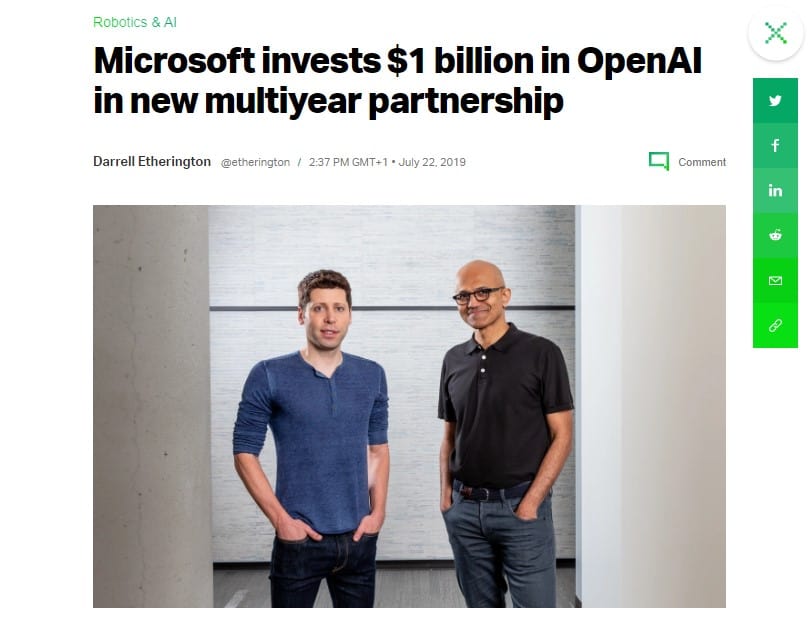
However, now technologies like ChatGPT and AI-generated art are becoming a reality.
In just three years, we have reached a point where schools are struggling to understand how to deal with AI.
These technologies exhibit what is known as hockey stick growth, in which very small increments accumulate over time and then compound and explode in a very short period of time and this is exactly what is happening right now.
The role of cloud computing in the partnership between Microsoft and OpenAI
The brilliant part of Microsoft’s 2019 agreement with OpenAI was that a portion of the $1 billion was paid in cloud computing credits.
And to understand how critical this is, consider that the most expensive aspect of operating and running an AI model is the insane amount of computing power required.
And it’s no surprise that this is the most biggest expense for any AI company.
And guess who is one of the world’s second-largest suppliers of cloud computing?
You guessed it, Microsoft is the second largest supplier of cloud computing in the world after Amazon AWS.
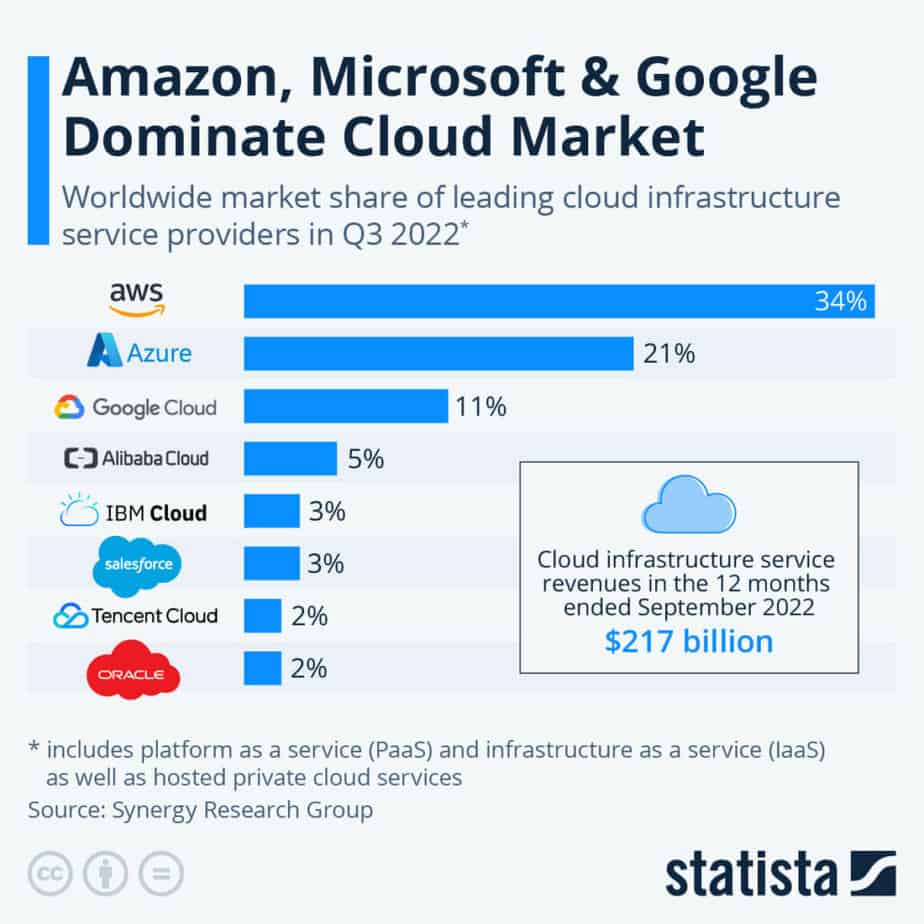
This partnership with OpenAI means that Microsoft will provide computing power for OpenAI, and in return, OpenAI will pay Microsoft back with its investment. This sets up an exclusive partnership between the two companies, and they will only become closer in the future.
And this is just the beginning of their plans…
Microsoft’s secret plans to acquire OpenAI for $10 billion
Recently, it was announced that Microsoft and OpenAI are working on a $10 billion deal that could be one of the most genius tech deals in history.
Microsoft is reportedly offering OpenAI $10 billion to own 49% of the company, and OpenAI will need to give Microsoft 75% of its profits until they repay the $10 billion.
But where is OpenAI going to spend all this money?
Well, mostly on Microsoft’s computing power.
And you might be wondering why would OpenAI agree to this?
First off, it will be extremely profitable for their employees and founders. But, more importantly, while GPT-3 is the hottest thing in the tech industry, it’s burning money like crazy.
OpenAI spends $3 million per day on cloud computing and expects to spend $1-3 billion on cloud computing alone next year.
This is already a fantastic deal for Microsoft, but it gets even better. The real plan is for Microsoft and OpenAI to lay the artificial intelligence foundations on which everyone else will build.
GPT-3 is merely a front-end application for the key ingredient, which is the trained AI model.
Chat GPT is a chat-based adaptation of the GPT-3.5 model, which stands for Generative Pretrained Transformer.
And to make it all work, you’ll need computing power, which Microsoft provides.
And because developing a new AI model from scratch is super expensive, many businesses prefer to pay OpenAI to use their existing models, such as GPT-3, for free via APIs.
For example, all of the AI tools are powered by GPT-3 and thus run on Microsoft servers indirectly.
Now, multiply this by thousands of companies and millions of AI interactions per day, both OpenAI and Microsoft will earn billions of dollars as a result of this.
The potential for Microsoft to challenge Google’s dominance in the AI industry
But that’s not all; they also have the chance to challenge Google’s dominance as the number one search engine.
When people first started experimenting with Chad GPT, their first thought was that it would be the next Google killer.
And Microsoft wasted no time as they’ve already started to incorporate Chat GPT into their search engine, Bing.
Let’s be clear about something. Until recently, Bing was essentially a copy of Google. The layout, the principles, everything is the same.
The reason they gained 9% of the market share is simply by being the default web browser on Windows.
But now they have a chance to bring true innovation, which hasn’t happened in 20 years. However, simply putting Chat GPT into Bing is not an option.
Microsoft must consider a number of critical issues. The first issue is bias and lawsuits.
Potential issues with bias and lawsuits in using AI systems
As AI systems are only as good as the data used to train them, there are already countless examples of how Chat GPT and other AI models like Dolly produce results that may be racist, offensive, or dangerous.
As a result, the model will have flaws.
For example, if you ask Bing to summarise the day’s news, some journalists will undoubtedly wonder if their article was created by AI to produce the results which is a legal complete mess waiting to happen.
And don’t forget that in 2016, Microsoft tried to release an AI chatbot a few years ago, but it had to shut it down almost immediately because it became excessively racist and inappropriate.
The economic challenges of implementing an AI search engine
Then there’s economics. The main issue with AI systems today is that they are insane expensive. A single Chat GPT response costs $0.02 cents in computational power, which is more than 100 times more than a traditional Google search.
And both Google and Bing now make money through pay-per-click, in which advertisers pay the search engine a fee for each click generated.
This, however, cannot happen because an AI search engine provides you with a straight answer rather than a bunch of links on a page so there is no way to throw ads there.
One solution is for Microsoft to create the first premium search engine model, where you pay a monthly fee to access something that is simply better.
So the question now is, why hasn’t Google done anything about it?
Why Google has not released its AI model?
Google has always been a pioneer in the AI space, but they haven’t released any meaningful AI-based products with the same impact as Chat GPT.
And this is because, while Google could revamp its entire search experience with AI, they have far too much to lose.
Google ads for 58% of Google’s revenue, so taking this risk could ruin their business model.
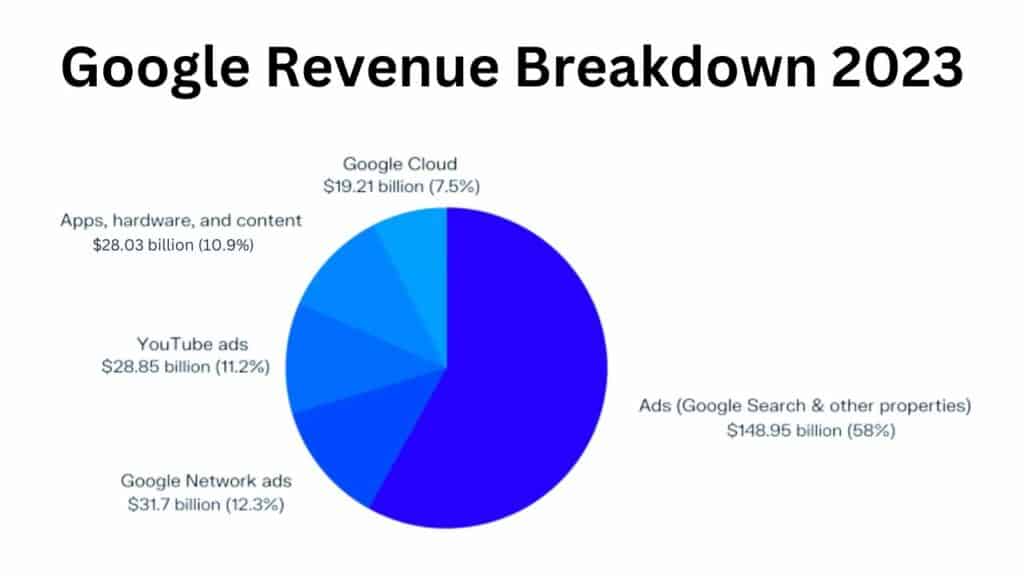
However, because Bing accounts for only 5% of Microsoft’s total revenue, the company’s risk is limited and the potential upside of taking this risk is enormous.
So far, everything seems to be falling into place for Microsoft’s plan to take over AI infrastructure in the coming decade.
The need for models like GPT-3 to remain defensible in order for Microsoft’s plans to succeed
But one thing needs to happen for all of this to become a reality: GPT models like GPT-3 must remain defensible, which means they cannot be easily replicated by another company.
Because if this happens, every company will instead develop their own AI models rather than rely on Microsoft and OpenAI.
Most AI tools that we see today are based on infrastructure models like GPT, but we just don’t know if this will continue to be the case in the future. AI will have a very interesting year in 2023.
Will Chat GPT Replace Google?
With that being said, it’s time finally answer the question; will Chat GPT replace Google?
Well, many people believe that ChatGPT, or future versions of it, will dethrone Google as the most popular search engine.
In fact, According to major news outlets, Google has issued a “code red” for the threat that chat GPT poses to the company.
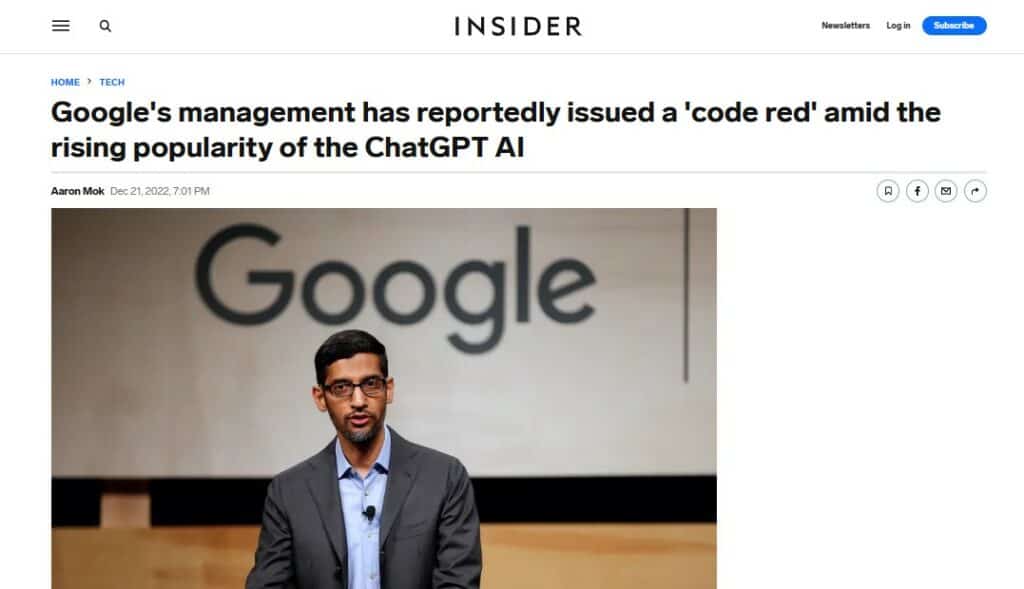
The thing about ChatGPT is that it can confidently give you the wrong answer in a way that makes the chatbot results credible. You will almost always need to conduct your own research, possibly by searching for more information on Google.
Except when using chat GPT for actions that do not require factual outputs. Google search is more trustworthy because it allows you to retrieve information directly from a source and verify its authenticity by inspecting the source of information.
The advantage of ChatGPT, on the other hand, is that it is extremely useful in providing answers as quickly as possible without having to sift through search results.
As with Google, the trade-off appears to be speed versus trust. The company that succeeds in both will be the dominant force in search.
Chat GPT can be used to speed up work, but I don’t think it can be completely relied on for some critical ones. People have begun to suggest ways to profit from the chatbot, with some claiming it can predict bitcoin price movements.
Work such as article writing and low-level coding are possible, but you will still need to monitor the results. Regarding price forecasts, I recommend that you avoid investing your life savings based on ChatGPT.
It’s not going to end well. Who knows, maybe GPT 4 will be able to do this. Or perhaps we’ll have to wait until GPT 15? The only way to know is to wait and see.

